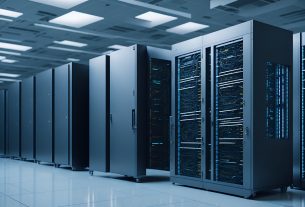Big data and cybersecurity are at odds with each other.
On one hand, big data is essential to marketing campaigns. On the other, however, it requires that we sacrifice some degree of cybersecurity.
How exactly, though, will big data affect cybersecurity in the future? How will it exploit cybersecurity? How will it inspire changes in how we secure our data on the web?
From the cloud to artificial intelligence, we’ll be exploring how big data and cybersecurity interact with each other. That said, don’t go anywhere just yet. You’ve got a lot to learn.
Cloud Control
The cloud has changed how we store data in today’s world. We’d say that the change has been overwhelmingly positive.
Unfortunately, though, this change has also welcomed data theft on a few occasions.
Just last year, Fox Business published an article about why the cloud attracts hackers. According to Thomas Barrabi, “a major company’s cloud system is a treasure trove.” Such cloud systems can house “millions of bank account logins, email addresses and Social Security numbers.”
Several major companies have already experienced data breaches in the age of information. Yahoo, for example, experienced a data breach only a few years ago.
Even so, companies continue to rely on the cloud in the workplace. Some companies even share a majority of their information with employees via the cloud.
So is this dependence on the cloud necessarily a bad thing?
Not exactly.
As it turns out, the cloud is pretty secure. New York Times writer Quentin Hardy actually writes that most cyber attacks “hit traditional servers.” As a matter of fact, “none of the most catastrophic hacks have been on the big public clouds.”
Still, we shouldn’t rest easy. Clouds contain massive amounts of sensitive data. There is no reason to think that big data and cybersecurity won’t bump heads in a major way.
Artificial Intelligence
Artificial intelligence has become trendy over the past decade or so. Companies are using chatbots to converse with customers. Other processes are slowly being automated as well.
But what does artificial intelligence actually have to do with big data and cybersecurity?
This Harvard Business Review article should give you some idea.
The article’s contributors assert that “AI adds a new layer to cyber risk.” They give numerous reasons for the increase in risk.
One of the biggest reasons they give for the increase?
Less human labor.
The article’s contributors point out that chatbots and other automated processes can be used by hackers to steal data. Yes, humans program chatbots. Humans, though, unlike chatbots, can’t be hacked.
Despite these concerns, automated processes are here to stay. Luckily for us, there is hope for the security of our data in the future.
Companies need only balance “the demands between automation and information security.” They can do so by “making cybersecurity integral – not an afterthought – to an organization’s information structure.”
The integration is easier said than achieved. With the right cyber professionals, though, it’s more than doable.
New Lines of Defense
We hope that we haven’t been too glum thus far. We just want to be honest about how big data and cybersecurity play together.
We also, however, want to highlight some ways in which big data can be good for cybersecurity.
In this section, we’ll go over some of the initiatives that can be taken in the future. Not only that, but we’ll talk about some initiatives that are already underway.
Data Storage
We’ve touched on some major concerns about storing data in the infamous cloud. Consequently, you already know that major companies and investors have been hit hard by hacks.
You might not know that even governments have identified cyber attacks as major threats to their infrastructures.
Ex-president Obama, for instance, began a counterattack on cyber attackers early last year. He called for “a surge in funding to counter cyber security threats.” His top intelligence official had actually concluded that “computer attacks were among the most imminent security challenges facing the United States.”
His top intelligence official had actually concluded that “computer attacks were among the most imminent security challenges facing the United States.”
What types of changes in infrastructure, then, did the Obama administration have its eyes on?
Well, for one, data storage. Obama signed an “executive order creating a permanent Federal Privacy Council.” The council “aims to connect privacy officials across the government to develop comprehensive guidelines for how personal data is collected and stored.”
Obama signed an “executive order creating a permanent Federal Privacy Council.” The council “aims to connect privacy officials across the government to develop comprehensive guidelines for how personal data is collected and stored.”
The administration also prioritized hiring qualified professionals to handle data. Keep reading to find out more about these cyber professionals.
Cyber Professionals
As we stated above, government officials wanted to “expand efforts to attract and retain qualified cyber professionals.”
Perhaps doing so seems somewhat easy. After all, the government seems to have an almost endless amount of resources.
Unfortunately, though, finding qualified professionals to manage big data is not a walk in the park.
Wall Street Journal contributor John Jordan beat the government to the punchline in 2013. Jordan wrote an article titled, “The Risks of Big Data for Companies.”
In that article, Jordan surmised that companies weren’t ready to handle big data. He even went so far as to say that “many companies don’t have the skills to work with big-data tools.”
As it turns out, he was right. Companies are struggling under the weight of all of the data they’ve amassed. If that info is compromised, so is their credibility.
In any case, companies have started to see the error of their ways. Recent data breaches have opened their eyes. Their epiphany has led them to sniff out qualified cyber professionals.
Their epiphany has led them to sniff out qualified cyber professionals. Hopefully, those professionals will handle their big data and cybersecurity concerns skillfully.
Big Data and Cybersecurity Will Continue to Duke It Out
The new changes in how companies deal with data are reassuring.
And, in some ways, we have big data to thank for those changes.
Still, big data and cybersecurity will continue to battle things out for years to come.
So what can you do to keep your data safe?
We’ll give you 2 tips, the first of which is to tighten up your internet security policy. Make sure that your employees know what the procedure is and that they follow it.
Our second tip? Secure everything, from your company’s website to your Twitter account. You’ll never regret the extra security.
Want more tips on how to keep your data safe? Reach out to us. We’re just a phone call or email away.




